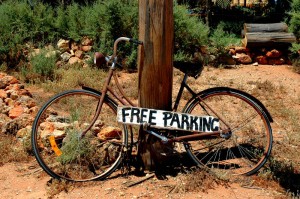Should Camping be Free?
 Should Camping Be Free? Benefits & Downsides of Free Campsites
Should Camping Be Free? Benefits & Downsides of Free Campsites
Every avid camper knows about those secret, free campsites. I am sure you know what I am talking about. When my girlfriend and I traveled through Australia we got a thrill out of spotting a nice free campsite somewhere. With a campervan it was easy to just ‘hide’ somewhere in a parking lot or some national park. Some states in Australia provide free overnight rest stops along the national highway. We thought these were great and obviously saved us a bit of money. It’s just a great feeling, being out there alone and camping in the ‘wild’.
Different countries have different regulations on camping. Gone are the times where you could just pitch up a tent, park your R.V. or Campervan in a place that is not a designated campground. With the increasing popularity of camping, governments and local authorities are clamping down and restricting camping areas. Many countries ask for permits or even completely banning so called “freedom camping”. On our travels through Europe we are discovering that campsites are sometimes even more expensive than youth hostels. What is going on here?
Banning Wild Camping
The reason for banning free or ‘wild’ camping are obvious: irresponsible campers who leave waste and do not consider their impact on the environment. Is it fair for local authorities to cover the cost of running and maintaining a free camping park? Would it benefit the local community, not just through more tourism, but also by encouraging and educating young people about respecting our environment?
What do you Think?
Does this mean everyone has to pay? Should camping be free? Should governments provide free camping sites? Have you got some great free campsite stories? Have you been caught camping in the wild? Let us know your stories and what you think. Please add your comments in the comment box below.





Camping in an RV and primitive backpack camping are two different styles here in many parts of the U.S. Money is made off both types of camping depending on where you go but there are still plenty of free areas. Most RV’s have to hook up to some sort of sewage drainage, which of course should be charged for, who wants to clean some ones waste for nothing? But in my opinion hiking and camping with a backpack is ideal for me. There’s hardly ever a fee for primitive camping, unless you’re renting a spot somewhere -which really isn’t any fun. Striking out on a trail into the wild is personally my favorite. Not because its free, but because you get to see a lot more on your adventure and you are away from other people as well. For me, camping is about getting away from it all, getting off the grid so to speak for a little while. Here in the US there are still thousands of hiking trails that go for miles and its all free. So, if you can help it, why not save your money for something else and camp where it’s free?
Very good points Bman! Thank you for your comment!
If you expect to have facilities such as toilets, fresh water, recycling station, drying room etc. then you should not expect them to be provided for free.
If you want to wild camp then you need to respect the environment and leave no rubbish etc. Obviously in remote places wild camping should be acceptable since it will not infringe on other people or farmers etc.
I recently read this interesting opinion by wild camper Freddy Philips:
http://blog.cheaptents.com/wild-camping-a-personal-opinion/
He says that:
“I don’t think it wise to campaign for legalisation, my own experience confirms that regardless of “law,” wild camping done with care for the environment and reverence for property is both feasible and trouble free. Wild campers have generally come to their craft through a mature process of love for the countryside, which we seek to enhance and nurture though a more intimate experience of long trails and the far horizons of our remaining and inspiring wild and lonely places. I do not believe an argument could be won with landowners that Joe Public can camp where he or she likes and attempts to do so may lead to a more effective prosecution of the current legal status quo, which by benign design or tolerant neglect is very favourable to Going Wild, let’s keep it that way.”